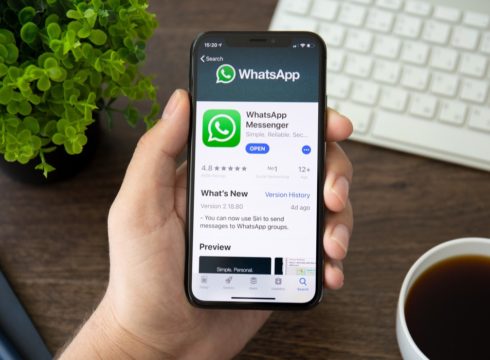SUMMARY
IIT professor Dr V. Kamakoti has proposed that message originator's name can be attached to the message
Last month, Madras High Court asked WhatsApp to respond to the professor’s proposals
WhatsApp has now said that the implementation of professor’s proposals is not feasible
Inc42 Daily Brief
Stay Ahead With Daily News & Analysis on India’s Tech & Startup Economy
WhatsApp has reportedly responded to IIT professor Dr V. Kamakoti’s proposal that WhatsApp can enable message tracing by appending each message with the name of the originator.
According to a media report which reviewed WhatsApp response, Nilesh Agrawal, a software engineer at WhatsApp said, “Dr Kamakoti’s proposals will force WhatsApp to fundamentally change its platform and wholly undermine its end-to-end encryption as users would be afraid to freely express themselves if their private thoughts would forever be linked to their identities”
Further, WhatsApp is said to have argued that it is not feasible to implement this proposal for Indian users only. WhatsApp would likely face several legal challenges if it were compelled to apply the Professor’s Proposals for all users across the globe. “It is also not feasible to determine the nationality of a user under WhatsApp’s current system,” the company reportedly added.
Also, the proposals would reportedly force WhatsApp to create and store a single master private key for all of its 1.5 Bn users, “violating the principle of data minimisation and rendering WhatsApp an extremely attractive target for hackers,” it added.
WhatsApp has also raised concerns regarding the impact of these proposals on the WhatsApp users who will be left vulnerable as there are no controls or safeguards to prevent the abuse of message originator’s identity. The company said, “It would make it easy for anyone in the forwarding chain to subject the originator to the risk of humiliation, harassment, retaliation, and physical harm when they do not agree with the user’s views.”
Another notable argument from WhatsApp is regarding the fact that many WhatsApp forwards are copy pasted from other platforms and hence, the proposal would lead users to believe that a certain phone number attached to a message is the true originator of that content, when in reality the real information source cannot be verified in such cases.
WhatsApp Traceability Case
Last month, an IIT Madras professor V Kamakoti, who serves on the board of National Security Advisory Board (NSAB), the security advisor for the Prime Minister’s office (PMO), had proposed two options for WhatsApp to enable messages tracing without affecting its end-to-end encryption.
- WhatsApp could embed information in an open and visible format: Originator information is included along with each encrypted message. This means each recipient of a WhatsApp message or forward will get to know the identity of the person who originally sent the message.
- The information can be encrypted: While the originator information continues to travel with each message, the recipient is not able to view it, as the information remains encrypted. But, it can be revealed to law enforcement by WhatsApp, when and if demanded.
Another key point noted by Kamakoti is that if a message is modified in any way – be it through copy and paste, addition of text to media like images, audio or video by any user, then that user becomes the originator and the responsibility falls on them.
His suggestion made it to the ears of the Madras High Court, which warranted a detailed explanation on July 31. Post which, WhatsApp was reportedly asked to respond to the suggestions by August 14.
The development comes as part of the government’s order to WhatsApp to trace messages being shared on its platform. Earlier this month, Facebook has filed a transfer petition in the Supreme Court on a lawsuit regarding WhatsApp traceability. The transfer petition is scheduled for hearing in the apex court on Tuesday, according to the court website. However, Facebook has not revealed where it wants the case transferred.
Indian government has also been working on finalising its data protection bill which has been in consultation for about a year now. Earlier today, the Ministry of Electronics and Information Technology has sent out a letter to select stakeholders for the second round of consultations on the draft bill.
WhatsApp has 400 Mn users from India, out of its 1.5 Mn global user base. Last month, the company has also announced plans to launch its WhatsApp Payments service in late 2019.
Note: We at Inc42 take our ethics very seriously. More information about it can be found here.


